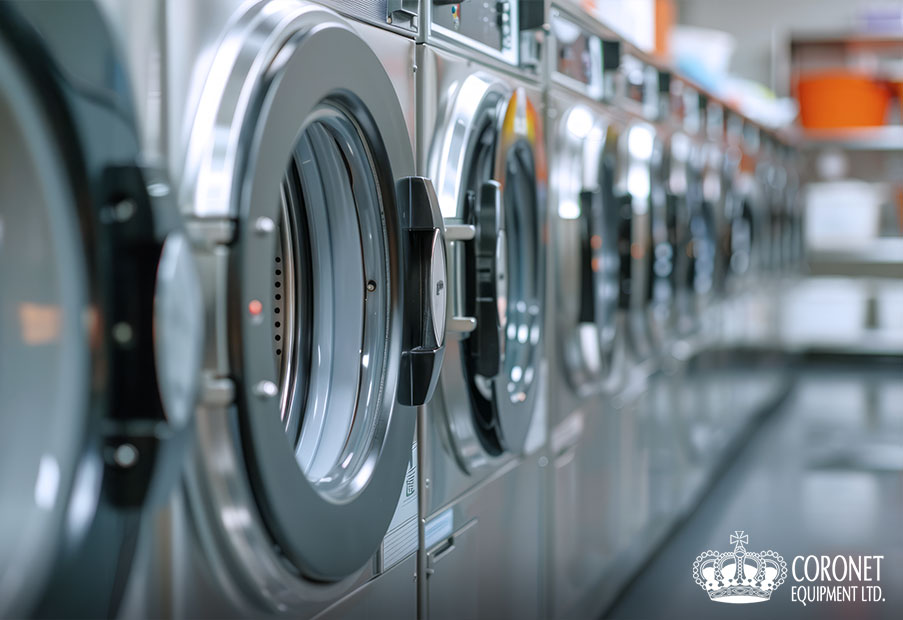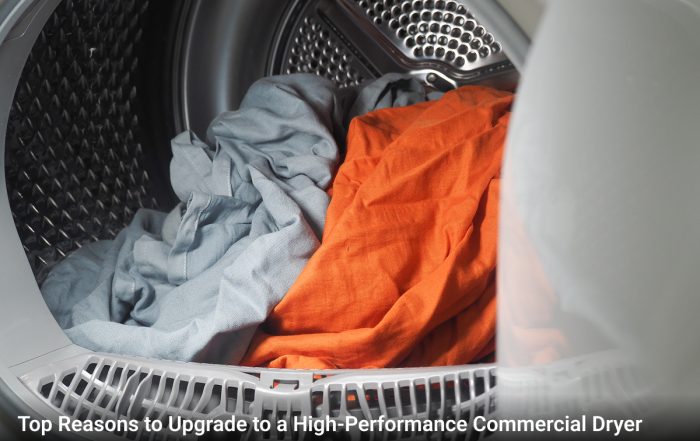
Tips for Maintaining Your Commercial Washing Machine
Commercial washing machines are renowned for their efficiency, durability, and superior cleaning performance. Using one can significantly enhance your laundry experience, allowing you to handle larger loads and tougher stains with ease. Want to learn how to maintain your commercial washing machine?
Benefits of Using a Commercial Washing Machine
Increased Efficiency and Faster Laundry Cycles
Commercial washers are designed for high-volume, frequent use, making them far more efficient than residential models. They can complete wash cycles faster, allowing you to do more laundry in less time. This is particularly beneficial for large families or households that produce a lot of laundry.
Higher Load Capacity
One of the most significant advantages of a commercial washer is its large load capacity. These machines can handle larger loads than standard residential washers, which means fewer cycles and less time spent doing laundry. This efficiency can lead to savings on water and energy bills.
Enhanced Durability and Longevity
Commercial washers are built to withstand the rigours of constant use in commercial settings. When used at home, this durability translates to a longer lifespan and less frequent need for repairs or replacements. Investing in a commercial washer can be a cost-effective decision in the long run.
Superior Cleaning Performance
Commercial washers provide better cleaning performance, especially for tough stains and heavy fabrics. They offer more robust agitation and higher spin speeds, ensuring your clothes come out cleaner and drier. This level of performance is particularly useful for items like work uniforms, sports gear, and heavily soiled garments.
Daily Maintenance Tips
Inspect for Visible Issues Before Each Use
Before starting a wash cycle, inspect your washer for any visible issues. Check for leaks, loose connections, or anything unusual. Addressing small problems early can prevent them from becoming significant issues later.
Properly Loading the Washer
Avoid overloading the washer, as it can strain the motor and reduce cleaning efficiency. Follow the manufacturer’s guidelines for load capacity and ensure clothes are evenly distributed in the drum to maintain balance during the spin cycle.
Using the Right Amount and Type of Detergent
Using too much detergent can cause buildup and reduce the washer’s efficiency. Always measure the detergent according to the load size and type of fabric. Opt for high-efficiency (HE) detergents designed for commercial washers to ensure optimal performance.
Cleaning the Detergent Dispenser Regularly
Detergent dispensers can accumulate residue over time, leading to blockages and inefficient dispensing. Remove and clean the dispenser regularly with warm water and a soft brush to ensure it functions correctly.
Weekly Maintenance Practices
Wiping Down the Door Seal and Exterior
The door seal can trap moisture, leading to mold and mildew growth. Wipe down the seal with a damp cloth and dry it thoroughly after each use. Also, clean the exterior of the washer to remove dust and grime.
Inspecting Hoses for Signs of Wear and Tear
Check the water supply hoses for any signs of wear, such as cracks or bulges. Replace any damaged hoses promptly to prevent leaks and potential water damage.
Cleaning the Lint Filter and Trap
Commercial washers often have a lint filter or trap that needs regular cleaning. Remove any accumulated lint to ensure proper water drainage and prevent blockages.
Monthly Maintenance Routine
Deep Cleaning
Perform a deep clean of the washer drum once a month. Use a commercial washer cleaner or a mixture of baking soda and water to scrub the interior. This helps remove any buildup and keeps the drum smelling fresh.
Checking and Tightening Loose Bolts or Connections
Vibrations during the wash cycle can cause bolts and connections to loosen over time. Inspect and tighten any loose components to ensure the washer operates smoothly and safely.
When to Call a Professional for Repairs
While many maintenance tasks can be performed at home, some repairs require professional expertise. If you encounter a problem that you cannot fix, or if the washer’s performance declines significantly, contact a professional technician. Preventive maintenance is the key to avoiding future problems. To keep your washer running efficiently, consistently follow the maintenance schedule and address any issues promptly. Coronet Equipment offers ongoing maintenance for commercial washing machines.
Adhering to a regular maintenance schedule ensures your washer operates efficiently and extends its lifespan. To stay organized, make a checklist of daily, weekly, monthly, and annual tasks. Conserve energy and water by using the washer efficiently. Only run full loads, and choose the appropriate cycle settings for each type of laundry. Efficient use saves resources and reduces wear and tear on the machine.
Regular maintenance is essential for maximizing the efficiency and lifespan of your commercial washer at home. Investing time in maintenance protects your investment and enhances your laundry experience, making the benefits of a commercial washer truly worthwhile.
Need Commercial Washing Machine and Dryer Solutions in Edmonton? Contact Coronet Equipment Today!
Recent Posts
When to Repair vs. Replace Your Commercial Washer
For businesses that depend on reliable laundry operations, from hotels and healthcare facilities to laundromats and multi-unit housing, deciding whether to repair or replace your commercial washer is a critical choice. The decision affects not [...]
Top Reasons to Upgrade to a High-Performance Commercial Dryer
For businesses that rely on laundry, whether laundromats, hospitality, healthcare facilities, multi-housing complexes, or on-premise laundry operations, choosing the right commercial laundry equipment is essential. While many companies focus on washers first, upgrading your commercial [...]
How to Know When Your Commercial Washer Needs New Parts
A dependable commercial washer is essential for any high-volume laundry operation. Over time, however, even the most durable machines experience wear on critical components. The good news is that washers usually show early warning signs [...]



